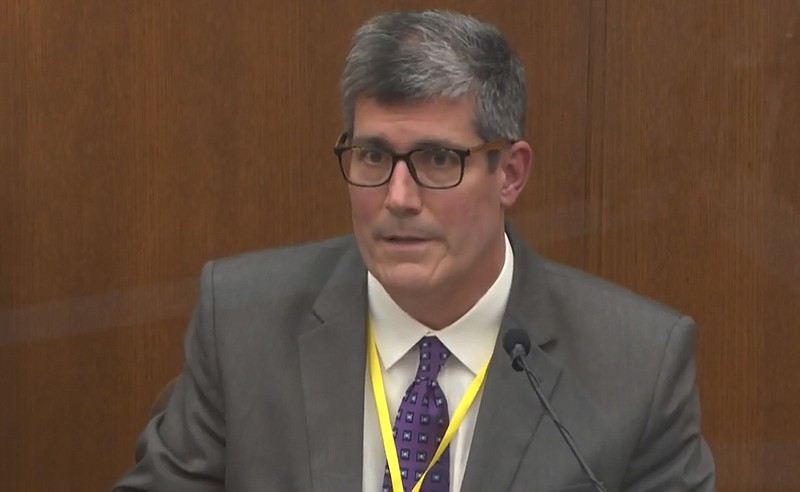MINNEAPOLIS -- The chief medical examiner who ruled George Floyd's death a homicide testified Friday that the way police held him down and compressed his neck "was just more than Mr. Floyd could take," given the condition of his heart.
Dr. Andrew Baker, the Hennepin County medical examiner, took the stand at the murder trial of former officer Derek Chauvin for pressing his knee on or close to Floyd's neck for what prosecutors said was as much as 9½ minutes as the 46-year-old Black man lay on the pavement last May.
Asked about his finding that police "subdual, restraint and neck compression" led to Floyd's death, Baker said Floyd had severe underlying heart disease and an enlarged heart that needed more oxygen than normal to function, as well as narrowing of two heart arteries.
Baker said being involved in a scuffle raises adrenaline, which asks the heart to beat even faster and supply more oxygen.
[Video not showing up above? Click here to watch » https://www.youtube.com/watch?v=WhCR8DW3E2M]
"And in my opinion, the law enforcement subdual, restraint and the neck compression was just more than Mr. Floyd could take by virtue of that, those heart conditions," the medical examiner said.
Other medical experts, including a leading lung specialist, have gone further, testifying that Floyd died from asphyxia -- or insufficient oxygen -- because his breathing was constricted as he lay on his stomach with his hands cuffed behind his back, his face jammed against the ground and Chauvin's knee on his neck.
Baker has not ruled asphyxiation as a cause of Floyd's death. And at one point, he said he is not an expert on lack of oxygen because he doesn't treat living people, and he would defer certain questions to experts on breathing.
Baker also said that based on his viewing of the video, he believed Chauvin's knee was "primarily on the back, or the side or the area in between on Mr. Floyd's neck." And he said it didn't appear from the video that his knee would have blocked one of the carotid arteries in the neck that supply blood to the brain.
Chauvin, 45, is charged with murder and manslaughter in Floyd's death May 25. Floyd was arrested outside a neighborhood market after being accused of trying to pass a counterfeit $20 bill.
Bystander video of Floyd crying that he couldn't breathe as onlookers yelled at the officer to get off him sparked protests and scattered violence around the U.S.
Chauvin attorney Eric Nelson has argued that the now-fired officer did what he was trained to do and that Floyd's illegal-drug use and underlying health conditions killed him. An autopsy found fentanyl and methamphetamine in Floyd's system.
Ted Sampsell-Jones, a law professor at Mitchell Hamline School of Law in St. Paul, Minn., said evidence about Floyd's cause of death is shaping up to be the biggest weakness for prosecutors. He said that with Baker's testimony, the jury is starting to see that the prosecution has been forced to distance itself from its own medical examiner.
However, Sampsell-Jones said the legal standard for establishing causation is quite low. The state has to show only that Chauvin's conduct was a substantial contributing cause.
"If the state had to show that Chauvin's conduct was the sole or even primary cause of death, the case would be in real trouble," he said.
Baker testified that neither Floyd's heart problems nor drugs caused his death. Under cross-examination, though, he agreed with Nelson that those factors "played a role."
A medical expert who testified Thursday said a healthy person subjected to what Floyd endured also would have died.
Nelson asked Baker whether he has certified deaths by fentanyl overdose at levels lower than that seen in Floyd's blood, and Baker said yes. But he also noted that levels of fentanyl must be considered in the context of how long someone had used the drug, any tolerance built up to it, and what other substances may be involved.
The medical examiner said that he did not watch the harrowing video of the arrest before examining Floyd so that he would not be unduly influenced by what he saw.
"I did not want to bias my exam by going in with any preconceived notions that might lead me down one pathway or another," he said.







